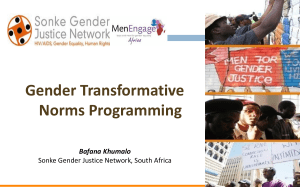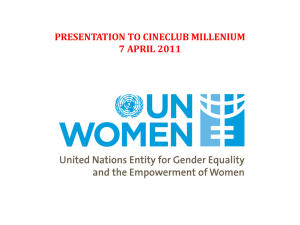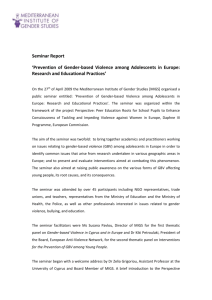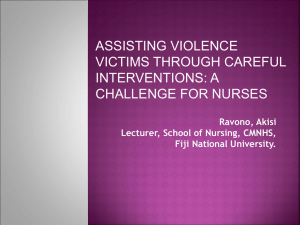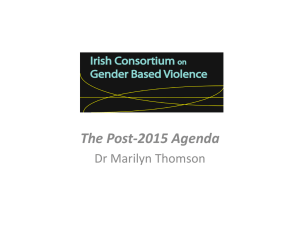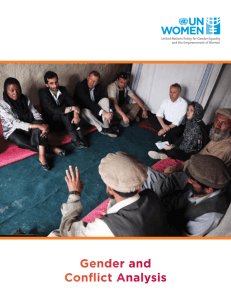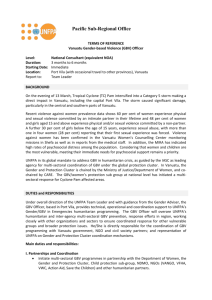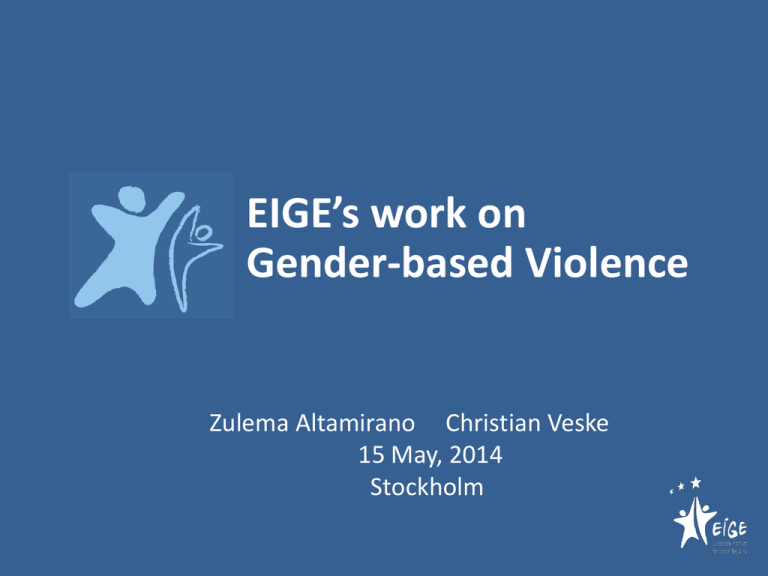
EIGE’s work on
Gender-based Violence
Zulema Altamirano Christian Veske
15 May, 2014
Stockholm
Content
Content
1. The role of EIGE
2. Preventing Domestic Violence in EU-28
3. Measuring Gender-based Violence in EU-28
1. Support Services for victims of DV
2. Female Genital Mutilation
3. Administrative data on GBV
4. Cost of Violence
4. Context:
1. Gender Equality Index
2. Gender Stereotypes
3. Raising awareness
The role of EIGE
Centre of Knowledge for
EU-28
Data and
indicators
Gaps
Database on
Gender
Statistics
Information
Methods and
tools
Resources
Good
practices
3
Preventing Domestic Violence in EU-28
“Collection of methods, tools and good practices in the field
of domestic violence (as described by area D of Beijing
Platform for Action)”
Awareness
raising
campaigns
Training in
prevention
Support
services
for victims
Programs
for
perpetrato
rs
4
Awareness-raising campaigns
• 144 examples (25 to young people).
• 76% national coverage ; 22% regional; rest
transnationals.
• 52% by NGOs; 42% by governmental bodies; 6% by
others.
• Trends:
– website or materials for ethnic minorities, and disable women
– lesbian and gay communication strategies
– minimum standards
5
Training on prevention
• 136 examples collected.
• 67% directed to professional sectors: most to police
and judiciary sector, followed by health personnel.
• 64% present in formal curricula.
6
Support services for victims
•
•
•
•
254 examples of implemented methods and tools.
61% with a national coverage, 39% regional.
54% by NGOs, 44% by government, 2% by others.
28% are direct services, 40% aimed at professionals.
7
Programmes for perpetrators
• 48 examples of programmes for perpetrators.
• Mostly:
– counselling, mentoring, coaching (69%);
– 16% to professionals –networks, guideliness or
minimum standards.
8
Support services for victims of DV
“Review of the implementation of the Beijing Platform for Action
in the EU Member States: violence against women – victim
support”
Scope:
Main
findings
• counselling centres
• emergency services
o Specialised
services for victims of DV, including
• hotlines
counselling
and shelters are
• women’s shelters/crisis centres
Insufficient
• legal advice for victims
distributed in and among the
• Unequally
health protocols
Member
States
• publicly
available
information
9
Female Genital Mutilation
““Study to map the current situation and trends of female genital
mutilation in 27 EU Member States and Croatia”
Main findings
o No harmonised FGM prevalence estimates and no comparable
national prevalence studies.
o Administrative data not systematically collected or centralised
o Need of a comprehensive strategy, based on a gender-sensitive
and human-rights approach, which empowers girls and women to
be in control of their lives and which balances the state measures
of protection, prevention and prosecution.
o Improvement in data collection and intensified efforts on the
behavioural change among FGM-practising communities, decisionmakers and stakeholders in the countries of origin.
10
Administrative data sources on GBV
“Mapping administrative data sources on GBV in the EU:
current status and potential”
Scope:
• Intimate Partner Violence
• Sexual Violence:
– Rape
– Sexual assault (excl.rape)
– Sexual harassment
• Stalking
Sectors:
• Police
• Social Services
• Justice • Health
EU Mapping tool
11
Administrative data sources on GBV
12
Administrative data sources on GBV
14 MS
12 MS
28 MS
28 MS
10 MS
(12 MS)
13
Quality of administrative data
QUALITY OF DATA
CRITERIA
Comparability
Geogr. &
overtime
Good timeliness
POLICE
JUSTICE
HEALTH
SOCIAL
SERVICES
% of
sources
% of
sources
% of
sources
% of
sources
76,7
73,9
71,4
57,1
73,9
71,4
42,9
27,8
81,8
57,1
70
60
96
83,3
90
69,6
Inmediatelly
Frequency of
updating:
Ongoing
Quality assurance
process in place
Yes
Administrative data sources on GBV
Main findings
o Police and justice are the systems with the widest
coverage of administrative data for all the types of GBV,
followed by social services, and mainly for IPV, sexual
assault and rape.
o Social services are more focused on IPV and they are
not influenced by criminalisation.
o In 24 Member States there are data sources colleting
disaggregated information by sex and age of victim and
perpetrator and their relationship. EU Mapping tool
15
Administrative data sources on GBV
Some remarks
o WHAT? A common understanding in terms and
definitions.
o WHY? Data are needed make the right policies and to
measure their effectiveness.
o HOW? A common methodology is required and quality
assurance process to ensure reliability and
comparability. Data on GBV must be disaggregated.
o WHEN? There is no mandate on GBV data collection
across EU-28.
o WHERE? GBV is multisectorial: social-justice-healthpublic problem.
16
Cost of Violence
“Study to assess the cost of violence against women across EUMember States”
Scope:
• Intimate Partner Violence
• EU-28
• Who bears the cost
• Sector and types of costs:
–
–
–
–
–
Health, welfare and labour market
Criminal and civil legal system and other public costs,
Human and emotional costs,
Impact future generation,
Long-term effects, etc.
Intersecting
inequalities
Discrimination
other social
groups
Work
Participation
Money
Segregation
Financial
resources
Quality of work
Economic
situation
Violence
Gender
Equality
Index
Direct
Indirect
Power
Political
Social
Economic
Health
Knowledge
Status
Attainment
Behaviour
Time
Segregation
Access
Economic
Lifelong learning
Care
Social
Gender gaps adjusted for
levels of achievement
Inequality
1
Equality
100
19
Results
20
Gender Equality Index
54.0
21
Study The involvement of Men in Gender Equality Initiatives in
the EU
The White Ribbon Campaign
Two on-line discussions on Men and Gender Equality
Men and Gender Equality a focus topic in RDC (2013)
Study on Stereotypes
Thematic Network on Men and Gender Equality
Involvement of Men in Gender Equality Initiatives
In total 317 organisations were mapped
24 entries related to violence
Available on EIGE’s website
Includes projects, activities, campaigns
The White Ribbon Campaign
26 White Ribbon Ambassadors:
•
•
•
•
•
•
•
•
•
Foreign Ministers of Estonia,
Finland, Sweden, Lithuania, The
Netherlands;
Prime Minister of Malta;
Commissioners of EMPL and
REGIO;
Civil Society activists;
Ministers of Justice of Estonia and
Ireland;
Heads of EU Agencies;
Minister for Gender Equality of
Denmark;
Michael Kaufman
Members of Parliaments
“I mean, it was on the other hand my father, who always used to
tell me that because of the fact that I am a man, I should defend
my sister. Because my sister, when she was very young, she was
very pretty girl. And her male classmates constantly teased her,
pulled her plaits and so on. And my father always used to tell me
to try to demonstrate here that I am a man and to protect my
sister.”
A Man from Poland
“I was born in a workers’ family, and my father he was very harsh
and demanding with his wife, sometimes even violent, and this
gave me a quite wrong vision of the relation between men and
women, as I lived that moment as a male authority imposed on the
family as a right and a duty, so for the whole time I was a boy I saw
this figure.”
A Man from Italy
Thank you!
European Institute of Gender Equality
www.eige.europa.eu
VILNIUS, Lithuania
27

